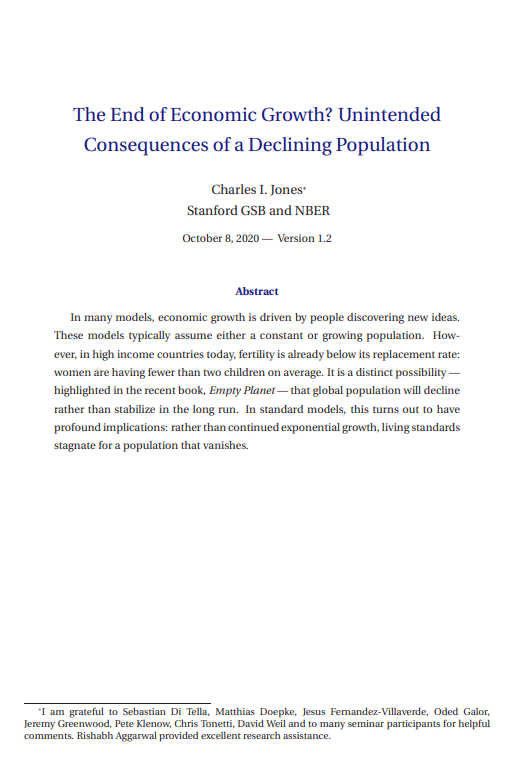The end of economic growth? Unintended consequences of a declining population
Charles I. Jones (Stanford University)
GPI Working Paper No. 13-2020 and published in the National Bureau of Economic Research Working Paper series
In many models, economic growth is driven by people discovering new ideas. These models typically assume either a constant or growing population. However, in high income countries today, fertility is already below its replacement rate: women are having fewer than two children on average. It is a distinct possibility — highlighted in the recent book, Empty Planet — that global population will decline rather than stabilize in the long run. In standard models, this turns out to have profound implications: rather than continued exponential growth, living standards stagnate for a population that vanishes.
Other working papers
Funding public projects: A case for the Nash product rule – Florian Brandl (Stanford University), Felix Brandt (Technische Universität München), Dominik Peters (University of Oxford), Christian Stricker (Technische Universität München) and Warut Suksompong (National University of Singapore)
We study a mechanism design problem where a community of agents wishes to fund public projects via voluntary monetary contributions by the community members. This serves as a model for public expenditure without an exogenously available budget, such as participatory budgeting or voluntary tax programs, as well as donor coordination when interpreting charities as public projects and donations as contributions. Our aim is to identify a mutually beneficial distribution of the individual contributions. …
High risk, low reward: A challenge to the astronomical value of existential risk mitigation – David Thorstad (Global Priorities Institute, University of Oxford)
Many philosophers defend two claims: the astronomical value thesis that it is astronomically important to mitigate existential risks to humanity, and existential risk pessimism, the claim that humanity faces high levels of existential risk. It is natural to think that existential risk pessimism supports the astronomical value thesis. In this paper, I argue that precisely the opposite is true. Across a range of assumptions, existential risk pessimism significantly reduces the value of existential risk mitigation…
Doomsday and objective chance – Teruji Thomas (Global Priorities Institute, Oxford University)
Lewis’s Principal Principle says that one should usually align one’s credences with the known chances. In this paper I develop a version of the Principal Principle that deals well with some exceptional cases related to the distinction between metaphysical and epistemic modality. I explain how this principle gives a unified account of the Sleeping Beauty problem and chance-based principles of anthropic reasoning…

